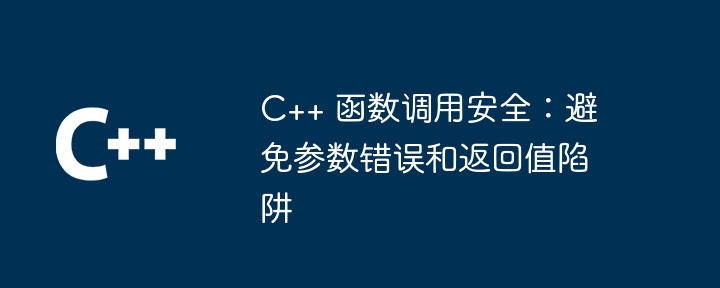
When calling a function in C, to avoid parameter errors and return value traps, you need to follow the following steps: Use type-safe parameter types and perform range checking to avoid parameter errors. Use error return codes and handle errors correctly to avoid return value traps. Make sure function prototypes and calls are consistent with parameter types and return values. Use debugging tools to detect parameter errors.

C function call safety: avoid parameter errors and return value traps
When calling a function in C, ensure that the parameters are passed and Correct handling of return values is critical. Neglecting these aspects can lead to subtle bugs and runtime anomalies.
Avoid parameter errors
Parameter errors usually arise from the following reasons:
Solution:
const, enum and templates. Practical case:
void SetSize(int width, int height) {
if (width <= 0 || height <= 0)
throw std::invalid_argument("Size must be positive");
_width = width;
_height = height;
}In this function, we use the type safety parameter type (int) to perform range checking, and throws an exception to handle invalid input.
Handling return value traps
If a function does not handle return values correctly, it may cause serious problems. Common pitfalls include:
Solution:
noexcept keyword to declare a function that does not throw exceptions. Practical case:
int LoadFile(const std::string& filename) {
std::ifstream file(filename);
if (!file.is_open())
return -1; // 文件打开失败
// ...读取文件并返回错误代码
return 0;
}This function uses the error return code (-1) to indicate the failure to open the file, and Declaring it will not throw an exception via the noexcept keyword.
Note:
The above is the detailed content of C++ function call safety: avoid parameter errors and return value traps. For more information, please follow other related articles on the PHP Chinese website!
 What are the differences between c++ and c language
What are the differences between c++ and c language
 Recommended learning order for c++ and python
Recommended learning order for c++ and python
 Cost-effectiveness analysis of learning python and c++
Cost-effectiveness analysis of learning python and c++
 Is c language the same as c++?
Is c language the same as c++?
 Which is better to learn first, c language or c++?
Which is better to learn first, c language or c++?
 The difference and connection between c language and c++
The difference and connection between c language and c++
 C++ software Chinese change tutorial
C++ software Chinese change tutorial
 Cost-effectiveness analysis of learning python, java and c++
Cost-effectiveness analysis of learning python, java and c++




